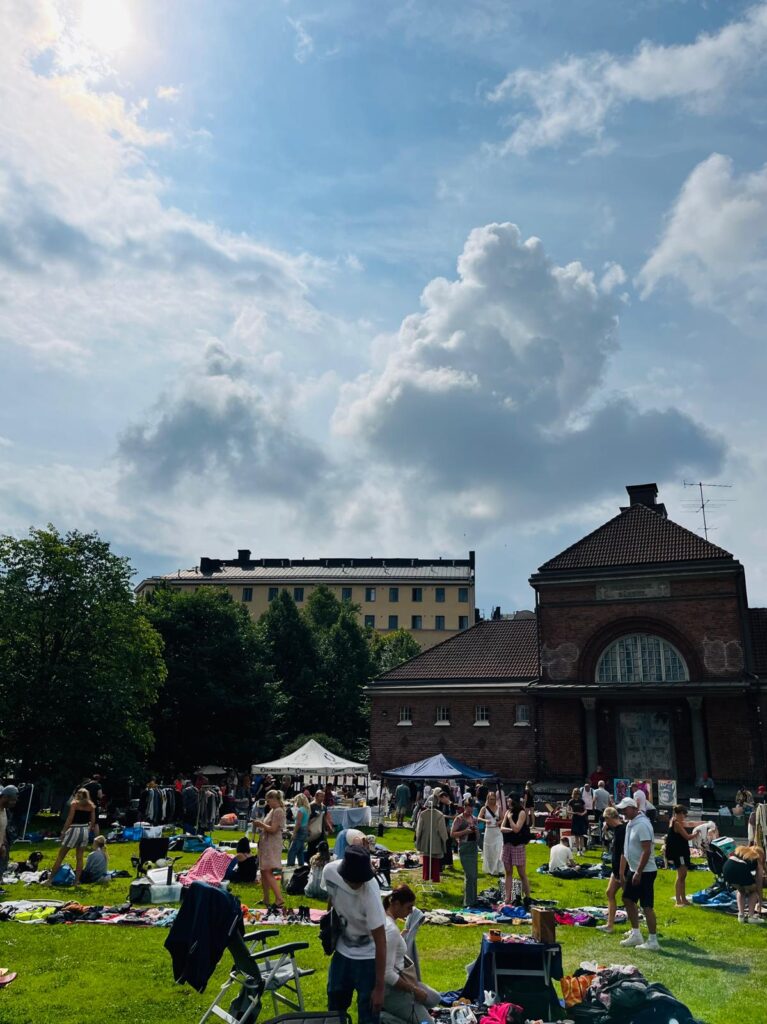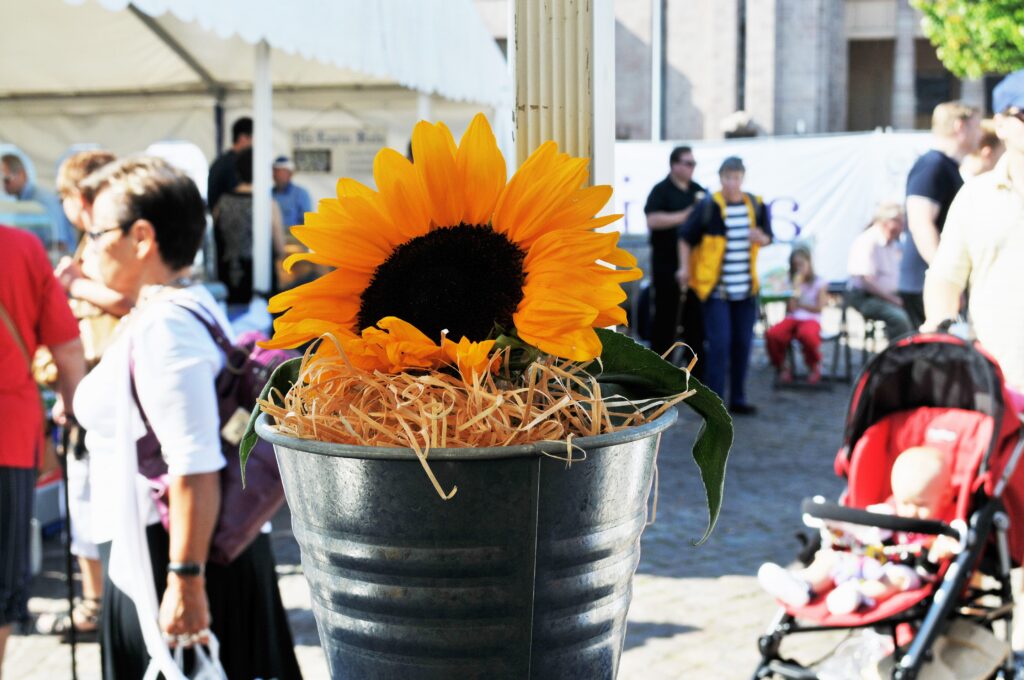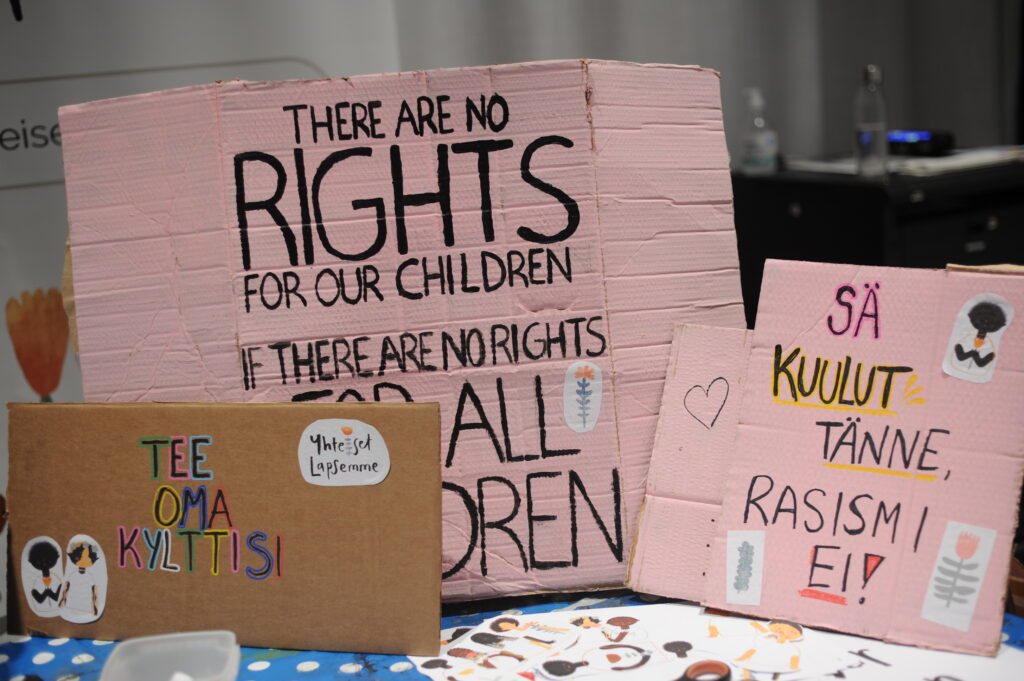“The one who plants trees knowing he will never sit in the shade of them has at least started to understand the meaning of life “-quote by Rabin Rabindranath Tagore, a Bengali poet, short-story writer, song composer, is at the core of eco-social thinking. Eco-socially educated person is an active participant of society, who is securing the ecological base of life, promotes human rights and thinks of sustainable development from the point of good future.
 Figure 1 Flea market vendors gather along Aleksis Kiven Street in Dallapé Park in Helsinki on summer Sundays, weather permitting. Anyone can go to there with their goods to sell during the flea market day, as long as they take the unsold goods away with them and clean up after themselves. It is also a lively street food event during the summers. Photo: Susanna Ahonen
Figure 1 Flea market vendors gather along Aleksis Kiven Street in Dallapé Park in Helsinki on summer Sundays, weather permitting. Anyone can go to there with their goods to sell during the flea market day, as long as they take the unsold goods away with them and clean up after themselves. It is also a lively street food event during the summers. Photo: Susanna Ahonen
The promotion of ecological sustainability thinking and social equality should be in the goals of education in any society. Eco-social principles and values embrace that we think about the social impacts and equality of our choices in addition to circular economy and sustainable use of resources.
Sustainable future and entrepreneurship
Sustainable entrepreneurship, supporting local food businesses (Laurea 2025a) and food waste management (Laurea 2025b) have been the themes of the recent projects that I have been managing.
The projects have been co-funded by the European Union and aimed to support local food industry and to create awareness. We also highlight the importance of these issues of supporting the local businesses to our students through co-operation with study modules.
Laurea’s projects do collaborative work with local organizations, municipalities, students and customers through co-creation methods following the pedagogy of our organization, Learning by Developing. (Laurea 2025c.) We respond to the changing needs of the society by producing workforce with supporting competences.
Students need to be aware of the significant importance of using local products and the benefits it has for the economy like employment, food and safety, securing the supply and the nature preservation due to shorter logistics for example.
In the Sustainable Food Entrepreneurship study module, we introduce students into the food business environment in Finland. We elaborate on the way the local food business economy works here, and the possibilities of entrepreneurship by introducing them examples of local producers and businesses.
During the course, they develop their own business ideas and learn basic service design methods to apply that thinking into the future’s business and society needs. We boost the students future thinking skills for example with methods of The Finnish Innovation Fund Sitra’s Toolbox (Futuremaker’s toolbox – Sitra).
The feedback gathered after the sustainable entrepreneurship study module showed that the students have increased positive attitude towards local businesses. They were pleased to have learned about these issues in addition to the general entrepreneurship themes like business plan creation and forms of business that traditionally are part of the entrepreneurship education.
Recycling and promotion of sustainable consumption
Eco-social principles include consideration of the social effects in addition to the sustainable use of resources.
The new EU initiatives towards the repairing of materials and equipment, Right to repair directive, is to be in force in the year of 2026 (Directive on repair of goods – European Commission 2025).
The Directive aims at promoting consumers to use their goods for longer thus preventing premature disposal of repairable goods. It launches several actions to promote repairing and prolonging the life of goods.
These initiatives support and restore, are better for the environment, with a lesser amount of waste, and it most probably creates more work in small and medium sized companies as well.
In recent years there has been an increase in the western societies’ goals like United Nations 2030 and The World Economic Forum (WEF) towards to the use of more shared goods.
Even though there are benefits of sharing we must consider all aspects of it. Ownership of assets has been a way for many to a better economic position. It can give a person a feeling of security, being less vulnerable to the fluctuations of the economy. The ownership of assets should not be concentrated and be in the hands of only a few either. According to the UBS Global Wealth Report, in 2023 the world’s richest 1 percent, those with more than $1 million, owned 47.5 percent of all the world’s wealth – equivalent to roughly $214 trillion (Inequality.org 2025).
Societal Entrepreneurship
For us to solve the complex problems of our planet and society, we must promote the students to use their intuition and creativity skills in finding new solutions. We teachers ought to give them space to rethink and support creative thinking. We can support students into thinking about the society as a whole in addition to profit making. To make profit is certainly important as then the businesses succeed, and the economy is prospering. The distribution of wealth should be wider, and this is an issue we must fight for. We can support the students into thinking about human rights and have empathy. Also, to show that complex problems can be solved and give them hope.
 Figure 2 A sunflower decoration in Food market in Helsinki, near main Railway Station. Photo: Susanna Ahonen
Figure 2 A sunflower decoration in Food market in Helsinki, near main Railway Station. Photo: Susanna Ahonen
In the sustainable food entrepreneurship study course, we invited a juice making company to talk about their business to the students and show how they are supporting social issues and welfare as well.
Omenasieppari company is making juice from apples and offers employment opportunities for people with difficulties finding employment; handicapped people or people with minor issues in cognitive matters but willing and able to work. I was very impressed about the owner Susanna Pykäläinen’s mission and values, and so were the students.
According to Susanna in Finland only 2 % of handicapped, with employability skills are working. Omenasieppari offers to gather the extra apples from people who do not need them and use them for making juice. This way the unused apples do not just rot but come to use. She said that in many years the supply of apples is more that they can use and even must decline some.
Omenasieppari company is supporting the society in several ways; societally, helping the nature and also being a viable company.
In spring 2025 during the current project Food Brings together (2025a) I interviewed food companies to gather data for benchmarking and learning of their needs of digital marketing skills. Many are looking for that competitive edge. Co-operating with partners supporting sustainable issues can be an option as well.
Promotion of Creativity and Intuition skills
Entrepreneurial skills include adequate collaboration skills, social skills and ability to express one’s own expertise. Entrepreneurship skills can be supported by teaching creativity and proactiveness.
Education can support creative thinking and listening your intuition. Teachers should create a learning environment where the students can ask questions and use critical thinking skills, and support finding new creative solutions together. Resulting in new solutions and companies with surprising, out of the box ideas.
That is why we should not forget to support playfulness and open discussion. We should support students’ observing, attentiveness, perception and sensitivity skills.
The eco-social culture means also understanding the cultural differences in societies. Preserving cultural knowledge is important, as there is highly useful knowledge there.
Current digital skills, the courage to try new things and international competences are demands of today’s working life and should be supported at all levels. Companies, societies and Finland are increasingly international and experiences of different cultures and working with people from different backgrounds are important skills to have.
 Figure 3: A stand of All our Children non-profit organization at an antiracism event in Helsinki, Oodi library. All Our Children (Yhteiset Lapsemme) is a Finnish national organization founded in 1988 and with no political, religious or ideological ties. Its purpose and function is to promote and protect the welfare and rights of immigrant children, children who are adopted internationally, and children of ethnic minorities. The writer is a voluntary worker in the editorial team of the organisation‘s periodical journal. Photo: Susanna Ahonen
Figure 3: A stand of All our Children non-profit organization at an antiracism event in Helsinki, Oodi library. All Our Children (Yhteiset Lapsemme) is a Finnish national organization founded in 1988 and with no political, religious or ideological ties. Its purpose and function is to promote and protect the welfare and rights of immigrant children, children who are adopted internationally, and children of ethnic minorities. The writer is a voluntary worker in the editorial team of the organisation‘s periodical journal. Photo: Susanna Ahonen
Talking about future and climate change is often frightening, which in turn negatively affect young people’s dreams of the future and starting a family. In the Youth Barometer 2024 (The Finnish Youth Research Society 2024), there were worrying changes in young people’s beliefs about the future; only 12 % thought very optimistically about the future compared to 36 % in 2021. 49 % think optimistically, but the change is significant. Instead of frightening, we should support positive thinking and how we have the opportunity to create something new and find new solutions to problems. We see opportunities, not just despair.
The sustainability in teaching tools is not just using digital tools. Supporting creativity can help students to tolerate uncertainty as well. It teaches us overcoming failures, which can be difficult in our society, where performance and efficiency are so often highly looked upon.
Creative methods in teaching support using feelings and creative thinking. Hopelessness can be turned into strength and creativity can give feelings of empowerment and individual achievement.
References
- Britannica.com. Biography/Rabindranath-Tagore. Rabindranath Tagore | Biography, Poems, Short Stories, Nobel Prize, & Facts | Britannica
- European Comission 2025. Entrepreneurship education in EU. Entrepreneurship education – European Commission
- European Union 2025. Directive on repair of goods, Official European Union website. Directive on repair of goods – European Commission.
- Luoma-aho, V. & Sulopuisto, O. 2017. Tulevaisuuden koulutuksen käsikirja: Askelmerkkejä kestävän koulutuksen kehittäjille. Sitra. https://www.sitra.fi/app/uploads/2017/07/Selvityksia1241.pdf
- Laurea 2025a. Project website, Laurea: Ruoka tuo yhteen (Food Brings together). Ruoka tuo yhteen – Laurea-ammattikorkeakoulu
- Laurea 2025b. Project website, Laurea: Food waste ecosystem. Food waste ecosystem – ruokahävikin vähentäminen ja hävikkiruoan hyödyntäminen – Laurea-ammattikorkeakoulu
- Laurea 2025c. Pedagogy and Co-creation, Laurea-ammattikorkeakoulu 2025. Pedagogy and Co-creation – Laurea-ammattikorkeakoulu
- Omenasieppari. Company website. https://omenasieppari.fi/
- Stewart, R., Charles, M.B. & Page, J. 2023. A future with no individual ownership is not a happy one: Property theory shows why. Futures, Volume 152, 2023,103209, ISSN 0016-3287. https://doi.org/10.1016/j.futures.2023.103209. A future with no individual ownership is not a happy one: Property theory shows why – ScienceDirect
- The Finnish Innovation Fund Sitra, Toolbox. Futuremaker’s toolbox – Sitra
- Youth Research 2024. The Finnish Youth Research Society, Finland. Youth research – Influential research on young people and youth